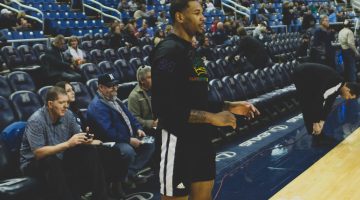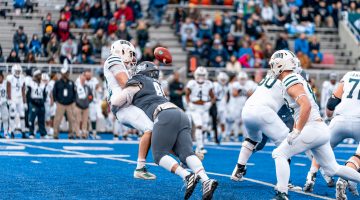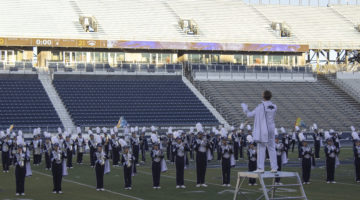By Alexa Ard
Tears streamed down all of their faces in the cold concrete locker room in Edward Jones Dome, the stadium of the St. Louis Rams.
There were only two options in the NCAA tournament: win or go home. On March 26, 2004, it was time for Nevada to return home. Garry Hill-Thomas, one of the guards at the time, said those tears fell because the run was over. The team would never be together like that again. They would no longer be going into battle together as one on the court.
Yet, the bond they created as brothers is one that was planted with deep, strong roots. Ten years after the Sweet 16, the lives of those players on that team, and the ones who came before, have continued to intertwine.
The One Who Set the Tone
The training camp for NFL Europe was held in Tampa, Fla. while Nevada was playing in the NCAA tournament in March 2004. Corey Jackson tuned in to watch his former teammates.
“It was a big deal because all of my football teammates knew I played basketball and knew it was my team,” Jackson said. “It was one of the proudest moments because the guys were playing really well, and everyone nationally knew who they were.”
Jackson was Nevada’s sole senior in 2001-2002, the team captain, sixth in the nation in rebounding with 11 per game and named the Most Valuable Player.
“Corey set the tone,” said Paul Mitchell, a professor at the Reynolds School of Journalism who has served as a mentor to several Nevada athletes. “The way that Corey went was the way that team went. And Trent (Johnson), to his credit, knew that when he recruited Corey that the success of that program hinged on everyone believing in Corey.”
The six-foot-seven forward traded in his basketball shoes for cleats in 2002. He became an NFL prospect after using his final year of eligibility at Nevada to play football. Jackson signed with the Cleveland Browns from 2003-2005 and the Denver Broncos from 2005-2007. In the NFL locker room, Jackson was surrounded by players who came from big-name schools.
However, during the 2004 March Madness, they all knew about Nevada.
“Everyone’s celebrating and going crazy just to see (Nevada) make it to that point,” Jackson said. “So it was very special for me because it just brought everything to the forefront. My university, and where I went at that time was very relevant. It was exciting to see that.”
Foreshadowing the Future
“If you didn’t know them then, you know them now,” one of the commentators of the 2003-2004 NCAA tournament said when the buzzer sounded for halftime. “The Wolf Pack can ball.”
This wasn’t news to Jackson. He wasn’t at all surprised by the success of the school in the biggest little city.
At the half, Nevada, standing at No. 10 in the nation, was leading No. 3 Georgia Tech 39-34 in the Sweet 16.
Head coach Johnson’s premonition rang through Jackson’s ears.
“You may miss the better days of the program, but you will be a huge part of building something special.”
He witnessed his head coach’s intuition unfold on the TV screen. He watched the boys that came in as freshmen battle as men on a national stage. Jackson was the only junior in his recruiting class. He came to Nevada with four freshmen: Andre Hazel, Garry Hill-Thomas, Craig Lewis and Sean Paul.
The next year, Nevada landed one of its best players of all time: Kirk Snyder.
Confident Kirk
The first word Jackson used to describe Snyder was confident.
In only his fifth game for the Wolf Pack, after being cleared to play on Dec. 27, 2001, the freshman guard attempted the game-winning shot against Fresno State on January 12, 2002. The Bulldogs were the reigning champs of the Western Athletic Conference regular season. They also possessed senior center Melvin Ely, who had a game-high of 34 points.
There were four seconds left.
Snyder had the ball in his hands. He was covered by Fresno State, but the off-balance Snyder decided to take the 30-foot three-pointer. To everyone’s surprise, including Bulldogs head coach Jerry Tarkanian and Snyder himself, the shot went in. It gave Nevada the lead, and with 2.2 seconds left Snyder put the icing on the cake with two free throws to seal the 88-85 victory.
Snyder was so happy that he burst into tears.
Yet, the six-foot-six guard wasn’t the only one who competed with confidence. The 2003-2004 team is often described as a confident group. They had to be. They were the underdogs.
The Dedicated

Todd Okeson transferred to Nevada in 2002-2003 after two years at Dodge City Community College in Kansas and was the starting point guard for the Sweet 16 squad the following year.
Senior Todd Okeson and freshman Marcelus Kemp spent a lot of time with the shooting machine. It paid off for Okeson’s final season in 2003-2004 and in Kemp’s future at Nevada.
The machine kicked out ball after ball, and the two guards perfected all aspects of their shot including range, form and arc.
“What people didn’t see is the amount of hours that Todd and Marcelus put in with the shooting machine,” Mitchell said.
One time Kemp called Mitchell right after he got off a plane to ask him to unlock the gym.
“He literally got off the plane and would go to the old gym,” Mitchell said. “He would shoot for hours, shot after shot after shot, and would spend five, six hours shooting. I’m not exaggerating. Todd would come in and shoot and shoot and shoot. He had a picture-perfect shot, but he was always shooting. That would typify (their) work ethic.”
This team was hungry for success. They were confident and passionate, and they had a great deal of chemistry that made them more than teammates. Hill-Thomas described it as “something special.”
“We were hungry,” Hill-Thomas said. “We were all mature, competitive kids, and more than anything, a brotherhood.”
They did everything together on and off the court. They watched out for one another and made sacrifices for the better of the team.
“Some guys could have probably scored more points than they averaged,” Okeson said in his Midwest accent. “Some guys could have taken more shots than they did. There’s a lot of give and take, and I think we came together as brothers on a team that year.”
Hill-Thomas was one of these players who saw a drop in his scoring average from his sophomore (15.6) to senior year (9.8).
After four years of sacrifices and built-up chemistry, it was time to be nationally recognized.
The Legacy
There were 30,801 spectators in Edward Jones Dome on March 26, 2004. About 1,500 of those fans made the 1,800-mile journey from Reno, Nev. to St. Louis. Nevada had not been to the NCAA tournament since 1985, and to this day, the Sweet 16 is still the farthest it has ever gone.
“It was almost a surreal feeling that we had got there,” Hill-Thomas said. “I can’t speak for everybody and say that moment may have been above our head. It was definitely something we had never experienced, but we were confident. We were a very confident group that we could win that game. We should have won it.”
The Wolf Pack went into that game against Georgia Tech with every intention to win.
The buzzer sounded when the clock hit zero. The scoreboard read Georgia Tech 72, Nevada 67. The camera scanned the crowd and the players, and in the process, got a shot of Okeson making his way off the court. The emotion in his face was obvious.
Nevada’s current head coach David Carter was an assistant coach during the run to the Sweet 16. Although he’s never watched the film of that game, he knows they should have won.
Anyone with a history at Nevada thought the Pack should have won. However, even with the loss, Nevada achieved the unexpected and caught the nation’s attention.
“It almost felt like I was still a part of it because of the connection I had with the team and the guys,” Jackson said. “It just felt great to see that happen for our university.”
On September 20, 2013, Johnson came the closest he’ll ever be to seeing most of his former Nevada players in one place again, at the same time. Johnson was one of the eight inducted into the Nevada Hall of Fame, and the induction dinner was held at the Reno Ballroom. About 30 of his former players made it to the event.
Jackie Johnson, Trent Johnson’s wife, reserved a room for the former players, coaching staff and whoever else was connected to the team following the dinner.
“For that one moment, we went back in history,” Jackson said.
One by one the players took the floor and spoke. When it was his turn Jackson returned the gratitude that Johnson showed him.
“I thanked Johnson for even coming out to that little college in the middle of nowhere to recruit this kid who everyone and the world said could never play Division I basketball, and made that possible for me,” Jackson said.
Okeson and Hill-Thomas both agree that they appreciate their journey to the Sweet 16 more than when they were going through it. Those tears they shed on March 26, 2004, in the locker room deep within Edward Jones Dome symbolized the rarity of that bittersweet run.
Alexa Ard can be reached at aard@sagebrush.unr.edu.












